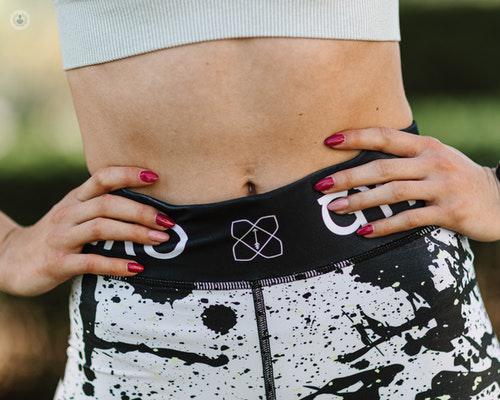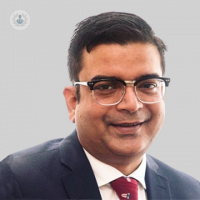Abdominoplasty: Risks, rewards and recovery (part two)
Written by:In the first part of this series, Mr Aftab Siddiqui, a revered consultant plastic surgeon, gave a comprehensive overview on the abdominoplasty, including the procedure, reasons for having it done and how to prepare for it. Here in the second and final part he outlines the risks, benefits and recovery guidelines for anyone who may be considering having a tummy tuck.

How bad is the pain after a tummy tuck?
Recovery from a tummy tuck can take up to two months, patients have reported feeling mild to moderate pain during this period. Immediately after surgery, patients usually feel pain, discomfort, tenderness and tightness at the point of incision and inside the abdominal muscles. The majority of patients experience the most pain during the first week post-surgery. Medication may be prescribed in order to ease the pain, which usually subsides towards the end of the week.
For partial abdominoplasty patients, the second week is easier as most of the pain will have stopped by then. Full abdominoplasty patients may continue to experience tolerable discomfort and tenderness as the area will take longer to heal.
Where Should I Expect Pain?
Although most people assume the majority of pain will come from the incision, you can feel pain in different parts of the body, depending on the kind of abdominoplasty you have. The abdominal muscles will be particularly sore after they are manipulated.
How should pain be managed after tummy tuck?
Following these steps is highly recommended for effective pain management:
- Firstly and most importantly, follow your doctor’s advice to ensure a speedy recovery.
- If told to, wear your compression garment for as long as required.
- Ask a friend or family member to call in on you during your recovery to help with daily tasks.
- Avoid physically demanding activities and lifting objects.
- Rest for a week or two, partaking only in relaxing activities like reading and watching movies.
- Although rest is vital, it is also important that you keep blood flowing by maintaining a low level of physical activity. While the abdominal muscle must be completely rested, thigh exercises are recommended to avoid blood clots.
- Follow a healthy diet, with reduced salt intake.
- Nutritional, vitamin-rich foods facilitate better and quicker healing.
Are there any medical benefits of a tummy tuck?
In addition to the obvious aesthetic benefits of abdominoplasty, there are also a number of medical benefits associated with this procedure including:
- Reduction of stress urinary incontinence (SUI): Women can develop this condition after childbirth. Studies have shown that tummy tuck procedures can ease the effects of SUI.
- Improved posture- Abdominoplasty tightens weak abdominal muscles which may have swollen due to the pressure placed on them by pregnancy or obesity. So, many patients notice an improvement in their posture after the procedure.
Risks and rewards
The popularity of abdominoplasty has led to the misconception that it is an easy procedure. Patients must remember it is a major operation that takes up to five hours to complete.
Full recovery can take a number of weeks and comes with similar risks of infection to any other major procedure. However, the medical and cosmetic benefits far outweigh the risk potential, hence its popularity.
Before deciding whether or not to go ahead with such a major operation, you should speak to a specialist extensively. Why not visit Mr Aftab Siddiqui’s Top Doctor’s profile? You can view his booking information and request an appointment with him.


